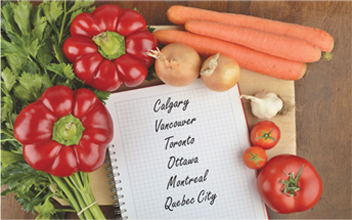Like much of Canada, Calgary has a growing ethnic presence (over 20 percent of the population), which helps drive its abundance of fruit and vegetable options—many imported from the U.S. West Coast—stocking gourmet food outlets. Indeed, the province’s restaurant industry reaches sales of $10 billion annually with Calgary claiming the majority of Alberta’s 9,800 restaurants.
Vancouver, British Columbia
Lying on the western edge of Canada in British Columbia, Vancouver looks a bit like Seattle, according to Bricker. “It’s our West Coast; people who live there tend to be a bit more laid back.” Bricker calls Vancouver “a lifestyle choice” due to what he considers its progressive politics combined with “jurisdictions where there’s a strong conservative coalition.”
Karin Gardner, marketing communications manager for The Oppenheimer Group based in Vancouver, describes the city as “ambitious but friendly” and credits its proximity to the ocean and mountains with what she calls a contagious “love for the great outdoors.” She describes residents as “fit, casual, globally conscious people who grow up valuing the planet and everything it has to offer.”
Bricker says the city is growing rapidly and has a large Asian population. Gardner agrees, adding, “Vancouver’s Asian community influences its cuisine, architecture, and culture in many ways. Retailers carry a wide range of items that appeal to this demographic, and in doing so create the opportunity for many healthy, interesting choices to be available to people of all backgrounds.”
Gardner credits Oppenheimer with helping to “introduce the holiday tradition of giving oranges as a Christmas gift in 1891. It began with immigrants from Asia who came to Canada to work on the Canadian Pacific Railway,” she explains, “and extended to the general western Canadian population over time. While it continues to be a much-loved tradition in British Columbia and the Prairie provinces, it never extended into eastern Canada in the same way. Even though easy-peel citrus has become an everyday item, people are still delighted to see Japanese mandarins appear in Vancouver stores in late November. You would rarely see the same response in Ottawa or Toronto, however.”
Much like the U.S. West Coast, Bricker says Vancouver’s economy is driven by natural resources such as lumber, timber, and mining. Oil and gas are also growing, especially liquid natural gas. The city, he says, has a “Silicon Valley feel” but is not nearly the same size as California’s high-tech mecca.
Bricker and Gardner both acknowledge Vancouver can be a pricey city, with the most expensive real estate market in Canada, but Gardner would argue that along with the expense comes “an excellent quality of life.”



